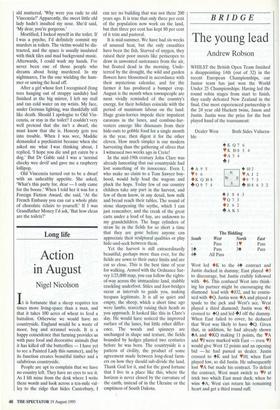Long life
Action in August
Nigel Nicolson
It is fortunate that a sheep requires ten times more living-space than a man, and that it takes 100 acres of wheat to feed a battalion. Otherwise we would have no countryside. England would be a waste of moor, bog and scrannel weeds. It is a happy coincidence that farming provides us with pure food and decorative animals (but it has killed off the butterflies — I have yet to see a Painted Lady this summer), and by its function creates beautiful timber and a salubrious countryside.
People are apt to complain that we have no country left. They have no eyes to see it. As I lift mine from the desk where I write these words and look across a ten-mile val- ley to the ridge that hides Canterbury, I can see no building that was not there 200 years ago. It is true that only three per cent of the population now work on the land, but that three per cent has kept 80 per cent of it trim and pastoral.
It is mid-summer. We have had six weeks of unusual heat, but the only casualties have been the fish. Starved of oxygen, they raised their poor snouts like periscopes to draw in unwonted sustenance from the air, but floated dead in the morning. Unde- terred by the drought, the wild and garden flowers have blossomed in accordance with their mysterious calendar, and for the farmer it has produced a bumper crop. August is the month when townspeople are most vividly reminded of the country's energy, for their holidays coincide with the period of maximum labour on the land. Huge grain-lorries impede their impatient caravans in the lanes, and combine-har- vesters emerge like dinosaurs from their hide-outs to gobble food for a single month in the year, then digest it for the other eleven. How much simpler is our modern harvesting than the gathering of olives that I witnessed two weeks ago in Crete!
In the mid-19th century John Clare was already lamenting that our countryside had lost something of its innocence. Even I, who make no claim to a Tom Sawyer boy- hood, would help load the wagons and pluck the hops. Today few of our country children take any part in the harvest, and few of them know, in any detail, how milk and bread reach their tables. The sound of stone sharpening the scythe, which I can just remember, and the creak of the great carts under a load of hay, are unknown to my grandchildren. The huge cylinders of straw lie in the fields for so short a time that they are gone before anyone can appreciate their sculptural qualities or play hide-and-seek between them.
Yet the harvest is still extraordinarily beautiful, perhaps more than ever, for the fields are sown to their outer limits and are cut so close. This is the best time of year for walking. Armed with the Ordnance Sur- vey 1/25,000 map, you can follow the rights- of-way across the immaculate land, stubble crackling underfoot. Stiles and foot-bridges occur at intervals to guide you, making trespass legitimate. It is all so quiet and empty, the sheep, which a short time ago were lambs, scarcely raising their heads as you approach. It looked like this in Clare's day. He would have noticed the improved surface of the lanes, but little other differ- ence. The woods and spinneys are unchanged in shape and texture, the fields bounded by hedges planted two centuries before he was born. The countryside is a pattern of civility, the product of some agreement made between long-dead farm- ers on how they should sub-divide the land. Thank God for it, and for the good fortune that I live in a place like this, where the horizon is never closed by the curvature of the earth, instead of in the Ukraine or the emptiness of South Dakota.


















































 Previous page
Previous page